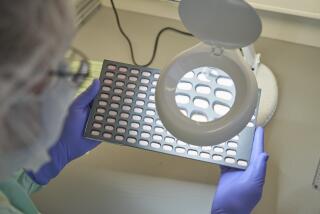AZT Cleared for Children’s Use, First Such AIDS Drug : Health: The FDA’s action is expected to make more such antiviral medicines available for pediatric use.
- Share via
WASHINGTON — The Food and Drug Administration on Thursday formally approved the antiviral AIDS drug AZT to treat children, making it the first AIDS drug sanctioned as standard therapy for pediatric use.
The drug was approved for use for patients three months to 12 years old who have fully developed AIDS or who are infected with the AIDS virus and show signs of a damaged immune system as measured by laboratory tests. In the latter group, they need not have overt symptoms of the disease. The drug already has been approved for adolescents and adults.
“AZT clearly benefits children,” said Dr. Dan Hoth, director of the division of AIDS for the National Institute of Allergy and Infectious Diseases, the government’s lead AIDS research agency. “With this approval, it will now be easier for children to get access to the drug. We think this is an extremely important milestone in the development of therapeutics for this disease because it is the first drug for children.”
Thursday’s action is expected to pave the way for more rapid testing and approval of additional AIDS drugs for pediatric use. The federal government has been under increasing pressure to make AIDS treatments and clinical trials of experimental AIDS drugs more accessible to children, since until recently there has been nothing available to them. With few exceptions, it has also been long-standing FDA policy that drugs of any kind cannot be tested on children or made available to them until they have been studied and approved for use in adults.
Hoth said that at least three other antiviral AIDS drugs--DDI, or dideoxyinosine; DDC, or dideoxycytidine, and CD4--are currently being studied in children.
Of the 128,319 reported cases of AIDS in this country since 1981, there have been 2,192 cases in children younger than 13, according to the federal Centers for Disease Control. Of these, 1,182 children have died. There are no reliable estimates of the number of children infected with the virus, although some experts have speculated that the figure is as high as 10,000.
AZT, also known as zidovudine, already has been in widespread use in children since last fall, when the FDA permitted access to the drug for compassionate reasons while pediatric AZT research was continuing.
At that time, however, Burroughs Wellcome, the manufacturer of AZT, provided the drug for free. The FDA decision to officially approve the drug for children now means that Medicaid, private insurance and other third-party payers now likely will cover its cost.
“FDA’s approval of AZT for pediatric use means that the drug is now officially considered to be a standard therapy for children with AIDS,” Health and Human Services Secretary Louis W. Sullivan said in a statement. “This status should encourage more insurance providers to reimburse for zidovudine’s use in pediatrics.”
The drug--whose dosage in children is determined by body surface size--costs an average of $1,750 a year for a child. It is available in a strawberry-flavored syrup.
“We’re very excited, and we’re looking now to see what happens with the next few drugs,” said Susan DeLaurentis, co-founder of the Los Angeles-based Pediatric AIDS Foundation, which raises money for pediatric AIDS research.
“We encourage the drug companies and the FDA to test drugs faster in children and approve them faster,” DeLaurentis added. “It is starting to happen--and we hope they will learn from the example of AZT.”
The FDA’s action came after its antiviral drugs products advisory committee--a panel of outside experts--recommended March 30 that the drug be approved for pediatric use.
The company cautioned, however, that children younger than 15 months of age undergo more sophisticated confirmatory tests for infection or a viral culture before beginning AZT therapy. The most commonly performed test for AIDS infection only indicates the presence of antibodies to the AIDS virus and children of that age whose mothers were infected often still carry antibodies--meaning that they may not necessarily be infected.
AZT, which was approved for adult use in 1987, has been studied in formal trials in more than 200 children since 1986. Once any drug has been approved for sale, physicians often prescribe it as they see fit, even for unapproved uses. But in the case of AZT, many health professionals have been reluctant to give it to children, afraid that its side effects may be more severe in this patient population.
AZT can cause toxic reactions, which include severe anemia requiring blood transfusions.
The findings of the pediatric trials have shown that children taking AZT experience side effects similar to those in adults. The studies have also demonstrated that children taking AZT experience the same benefits as adults--that is, it prolongs survival, relieves symptoms, encourages weight gain and enhances the quality of life.






